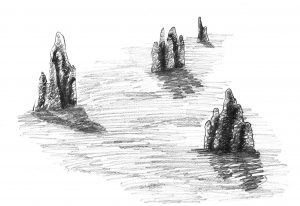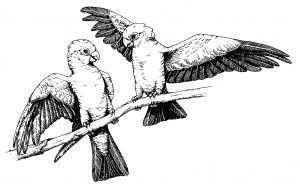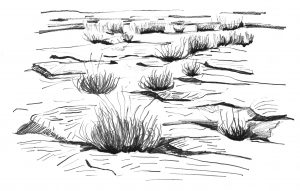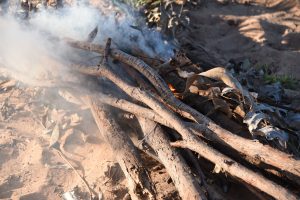adverb
Adverbs modify the meanings of verbs, for example, mira ‘very’.
art
This is short for article. Mawng has four articles: ja, jita, ta and mata that change shape for each gender and pata for human groups. They often appear before nouns, like the English article the.
coverb
Coverbs are words that cannot occur on their own but combine with certain verbs to form constructions that have similar meanings to verbs, for example, kerra pularnngalk ‘forget’. Each coverb is listed as a headword and the coverb construction is listed as a cross-reference to help you find the coverb entry.
crossreference
Cross-references are not a part of speech but the label ‘crossreference‘ appears at the same place as parts of speech. Cross-references are pointers to help you find what you are looking for (see further discussion of cross-references here).
dem
Short for demonstrative. There are many demonstratives, words like ‘this’ and ‘that’, in Mawng. They are listed in Section 6.
dtv
Indicates a ditransitive verb. A verb that talks about somebody who does something, somebody else who has something done to them and another person or thing e.g., Nangila kinny-u-n Nangarrij walij. ‘Nangila gives Nangarrij food’. Takes a transitive prefix.
ideophone
Ideophones make an image of an action with sound, such as ‘pop!’ in English.
interjection
Interjections are small words that express something direct, such as wardaw! ‘ow!’ or ma ‘okay’.
iv
Means the entry is an intransitive verb. A verb that talks about one person or group that does something. For example, Nangila kiwryi. ‘Nangila swims’. Takes an intransitive prefix.
loc
Short for locative adverb. For example, kani ‘here’ or kapa ‘over there’.
noun 
Nouns. This category also includes ‘nominals’: nominal modifiers, quantifers and adverbs.
nvidiom
Indicates a noun-verb idiom. An expression that combines a noun and a verb to give a conventionalised meaning.
part
Short for particle. Words with a grammatical function that cannot be categorised as any other part of speech.
phrase
Phrase. Multi-word expressions associated with a conventionalised meaning.
postverbal
Post-verbal particles. These particles must follow the verb or coverb directly.
prep
Short for preposition. Mawng has two prepositions: the locative preposition tuka which says where something is, and the purposive preposition nuyu which comes before an explanation of why somebody does something.
pro 
Short for pronoun. There are many pronouns, words like ‘he’ and ‘yours’, in Mawng.
suffix
Two suffixes can occur on a wide range of words in Mawng: -(a)pa and –wi(~pi). Verb suffixes are not listed in the main part of the dictionary but are listed here.
tv
Indicates a transitive verb. A verb that talks about somebody who does something and somebody else who has something done to them, e.g., Nangila kini-wu-n Nangarrij. ‘Nangila hits Nangarrij‘. Takes a transitive prefix.





